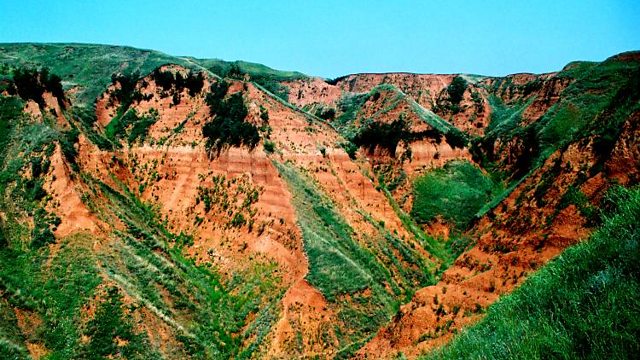
Early Humans
Early Humans; Life in the Dark; NHS is 70; Neutrino Discovery; Brazil’s Healthcare System; EU Copyright law; VR Molecules.
Early Humans
Archaeologists in China have ‘peeled back’ 17 layers of sediment and fossil soils formed during a period spanning almost a million years. They’ve revealed stone tool fragments and animal bones at the site in Shangchen in the southern Chinese Loess Plateau. Prof John Kappelman tells Roland Pease about a Chinese team that has dated the discoveries and finds that the timing of when early humans left Africa and arrived in Asia is earlier than previously thought – now over two million years ago.
Life in the Dark
Given that half the world is in the dark half of the time, and the depths of the oceans are perpetually hidden from sunlight, there's lot of darkness to explore. For those of us drawn to the shadows, a new exhibition at the Natural History Museum in London does exactly that. Geoff Boxhall, professor of invertebrate biology, gives Adam Rutherford a tour of Life in the Dark.
NHS Birthday
The National Health Service in Britain, which is celebrating its 70th birthday, has influenced health services around the world. Claudia Hammond speaks to Dina Bala-banova, Associate Professor of Health Systems and Policy at the London School of Hygiene and Tropical Medicine, about the impact it’s had on other health systems.
Neutrino Discovery
An international team of scientists has discovered a flaring blazar in a far off galaxy. The astronomical phenomenon is releasing high energy neutrinos. It was traced by an icebound neutrino detector situated a mile under the South Pole at the IceCube Neutrino Observatory with the help of telescopes from around the globe. Until now, the sun and a nearby supernova were the only sources of these neutrinos. Dr Naoko Kurahashi Neilson tells Roland Pease about the findings.
Brazilian Healthcare
One country that has been trying to achieve universal health coverage is Brazil. Leonor Pacheco is Professor of Public Health at the University of Brasilia. She speaks to Claudia Hammond about the country’s national health service, which began in 1988 when a new constitution enshrined healthcare for all as a right.
EU Copyright
Tech giants might save themselves billions in pay-outs to publishers, record labels and artists after EU lawmakers recently voted to reject proposed changes to copyright rules aimed to force tech companies to share more of their revenues. Gareth Mitchell talks to Rufus Pollock from the Open Knowledge about achieving a fairer system.
VR Molecules
How we envision complex atomic structures is not easy: think of that famous photo of Crick and Watson standing next to the model of DNA, a towering structure of steel rods and metal clamps, little balls showing where the atoms are. Chemists have used these sorts of models for centuries. But this is the digital age, and at Bristol University in the UK, David Glowacki has put the power of virtual reality into the hands of the molecular magicians. Roland Pease went to his virtual lab, to see atoms dance in a molecular space odyssey.
Image: The loess-palaeosol sequence at the Shangchen Palaeolithic locality, Lantian County, Shaanxi Province, China Credit: Prof. Zhaoyu Zhu
The Science Hour was presented by Claudia Hammond with comments from David Robson.
Producer: Katy Takatsuki
Last on
More episodes
Broadcast
- Sat 14 Jul 2018 11:06GMT����ý World Service Americas and the Caribbean
Podcast
-
![]()
Unexpected Elements
The news you know, the science you don't

